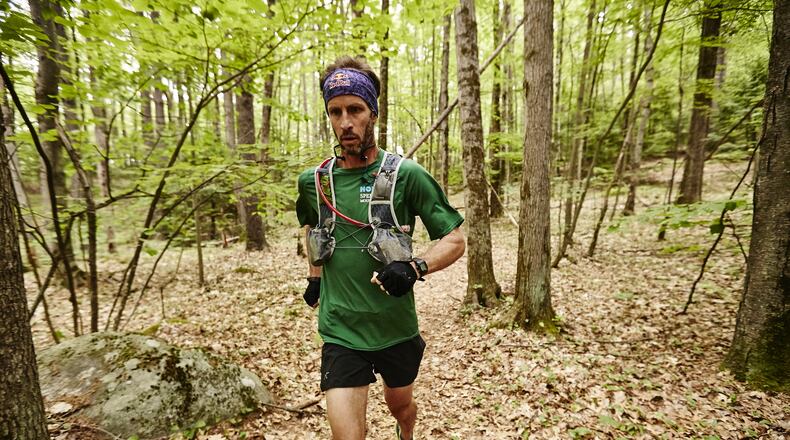Setting out each morning with his pockets full of bacon and finishing each evening with a few beers, ultra-marathoner Karl Meltzer ran his 45-day race from Maine to Georgia his own way.
“I just needed calories,” said Meltzer, 48, explaining the diet of candy bars and sausage that fueled his gallop along the length of the Appalachian Trail. Looking hungry, but satisfied, Meltzer bathed in a post-race glow Monday evening, gobbling appetizers of french fries and foi gras at a Little Five Points beer pub called The Porter.
Credit: Bo Emerson
Credit: Bo Emerson
He was joined in the pub’s basement eating room Monday by members of his support team and representatives of the energy drink Red Bull, which he guzzled along the way; Red Bull underwrote part of the cost of his feat.
With his grizzled beard and hollow cheeks, Meltzer, at 141 pounds, looked no more gaunt than most 100-mile runners, but his accomplishment was the equivalent of running 20 of those ultra-marathons in a row.
Credit: Bo Emerson
Credit: Bo Emerson
Meltzer ran and hiked the 2,190-mile length of the Appalachian Trail in 45 days, 22 hours and 38 minutes, the fastest known time for a supported race. He reached Springer Mountain in North Georgia, the southern terminus of the trail, at 3:38 Sunday morning, then slipped off down the mountain for a pizza and a well-deserved rest.
Because his race was “supported,” Meltzer carried no tent, no sleeping bag, no stove, none of the usual encumbrances of the AT hiker, nothing but a fanny-pack with a few changes of socks and 36 ounces of water.
Credit: Bo Emerson
Credit: Bo Emerson
His colleagues, including his father Karl Sr., 73, (who the team calls “Senior”) and his driver and collaborator Eric Belz, paralleled the trail in a white Ford Econoline van, and met Meltzer on the trail several times each day, bringing water, food and dry shoes. Each evening Meltzer (nicknamed “Speedgoat”) would meet Belz at a pre-appointed spot on the trail, hike to a nearby parking area, eat a supper cooked by his minders, and sleep in the van. Each morning at 4 a.m. the alarm would wake Meltzer and he’d be off and running by 5, navigating in the darkness with the aid of a headlamp.
(A marvelous account in a blog by Andy Jones-Wilkins demonstrates how Meltzer spent almost every resting moment shoving food in his mouth, "like an IV drip.")
A one-time ski-resort bartender who lives in Sandy, Utah, Meltzer has won more 100-mile races than anyone on the planet, but has failed twice before in attempts at the AT record. He kept the previous record-holder, Scott Jurek, in mind as he traveled along the spine of the east coast during the last six weeks, calculating from moment to moment whether he was ahead or behind.
Last summer Jurek notched a fastest-ever south-to-north through-hike of 46 days, 8 hours, 7 minutes. Amazingly, Jurek helped with the destruction of that record, supporting Meltzer with advice and literally lighting Meltzer’s way during the last 30 miles of Georgia darkness, from Neels Gap to Springer Mountain. He walked behind Meltzer, carrying a 300-lumen torch to shine on the trail ahead.
"It was so inspiring to have Scott on my side," said Meltzer, glancing up at a monitor that showed a loop of highlights of the Meltzer trip. Red Bull detailed Meltzer's journey with a blog and an upcoming video documentary.
The online community hasn't been 100 percent in favor of the corporate-sponsored feat. Among the commenters on a New York Times story on Meltzer was a "brad jacobson" of Cleveland, who said Meltzer's race was a "stupid" stunt, and that Meltzer missed the beautiful vistas in his hurry: "Like doing the Uffizi gallery in twenty minutes."
Others mentioned that in 2015 Heather “Anish” Anderson, a Seattle woman nicknamed “The Ghost,” completed the hike in 54 days, 7 hours, and 48 minutes, with no support but her own gumption.
Meltzer says he respects Anderson’s accomplishment, as he respects the through-hikers who take a more leisurely 6-month pace. Of the criticisms, he says “I enjoy it my way and they enjoy it their way.”
His most impressive moment on the trail may have been the last 83 miles, from Deep Gap, North Carolina to Springer, which he traveled in a single 23-hour slog. “I have an 83-mile run in me anytime I need to do it,” he said.
What’s next? It will take him several weeks to recover, said Meltzer, but he plans a speed-golfing competition later this year (he once shot 230 holes in 12 hours.) And later that Monday evening? “We’re probably going to a bar somewhere,” he smiled.
About the Author
The Latest
Featured






